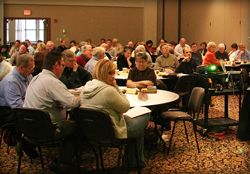Criticism Is Harmful To Your Marriage
By Gina Binder for YourTango.com
Is nagging really so bad? I’ve been married to a divorce lawyer for 26 years and he’s never claimed that nagging is worse for a marriage than cheating. After all, most of us seem to think of nagging as annoying, but pretty benign and harmless. And some of us feel like we’ll never get what we want unless we ask for it in 50 million ways. Yet almost a year ago, Wall Street Journal columnist Elizabeth Bernstein made the provocative claim that nagging is a “marriage killer… more common than adultery and potentially as toxic.”
A little science supports her statement. Howard J. Markman, Professor of Psychology at the University of Denver and the Co-Director of the Center for Marital and Family Studies, spent 30 years studying conflict patterns and divorce. His team found that negative conflict patterns, consistent with nagging, attack love and jack up the risk of unhappiness and potential divorce. Markman knows something we all know: nagging is common. And therein lies its inherent danger. Your relationship is like a house in a falling rock zone: nagging frequently causes rocks to roll onto your house and chip away love, while cheating triggers an avalanche. You stay on the lookout for avalanches, but may be unaware of the long-term damage done by the frequent falling rocks.
So while nagging may actually not be worse for our marriages than cheating (falling rocks versus avalanche), maybe we need to recognize it as a genuine detriment to relationships. I can think of three important ways that persistent nagging can erode a relationship’s foundation.
First up: Communication. Let’s explore a scenario: the Nagger gets really nervous whenever Nagged One drives on long vacations. He’s more aggressive behind the wheel and that triggers her anxiety. So she reminds him of the speed limit every five minutes, and uses hand and foot signals to encourage him to slow down. With each hour, Nagger’s voice, hand, and foot signals become more emphatic, and Nagged One becomes less attentive or maybe explodes in irritation. Neither spouse feels understood, and most likely neither understands the other. Nagging hijacks empathic communication.
Second up: Connection. When was the last time you wanted to cuddle up with your spouse after being nagged — or after nagging? Usually the more one nags, the faster and farther the other runs… literally or figuratively. If you nag your wife about something on the way to a nice restaurant, an evening out may lose its sparkle before drinks are served. If the two of you are trapped in a nagging cycle, you may confuse your struggle (nagging) with your identities (two people who can’t get along). Nagging can make you lose track of who you are: two people who love each other and struggle with an ineffective communication habit. Think about changing your habit before you dream about changing your partner.
Third up: Trust. If you are the nagger, you may feel uncared for if your spouse repeatedly rejects your persistent pleas. If you are nagged, you may correctly think that your spouse does not trust you to be responsible in a particular area or in many areas. When nagging becomes entrenched, you each may feel like the other does not have your back. Trust erodes — not because Nagger and Nagged One are inherently flawed — but because each is persistently trapped in an ineffective communication pattern. What if Nagger clearly states what he/she wants and explains why, and Nagged One honestly states his/her intention and when he/she will comply? Each may need to compromise a little, but trust will begin grow. (And they can throw away their nagging labels).
So maybe nagging can’t bring home an avalanche like cheating can. But if it persists unabated in your relationship, it can become an off-the-radar marriage killer. Perhaps it’s time to take another look at this common communication pattern in our relationships.

